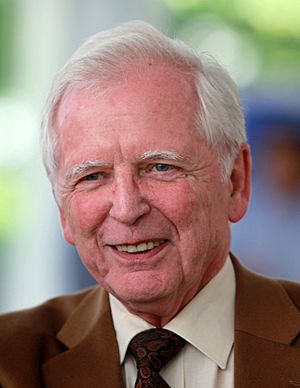Harald zur Hausen facts for kids
Quick facts for kids
Harald zur Hausen
|
|
|---|---|

Zur Hausen in 2010
|
|
| Born | 11 March 1936 Gelsenkirchen, Gau Westphalia-North, Germany
|
| Died | 28 May 2023 (aged 87) Heidelberg, Baden-Württemberg, Germany
|
| Known for | Discovery that HPV can cause cervical cancer |
| Awards | Ernst Jung Prize (1996) Prince Mahidol Award (2005) Nobel Prize in Physiology or Medicine (2008) |
| Scientific career | |
| Fields | Virology |
| Institutions | German Cancer Research Center University of Heidelberg |
Harald zur Hausen (born March 11, 1936 – died May 28, 2023) was a German scientist who studied viruses. He won the Nobel Prize in Medicine in 2008.
Contents
Early Life and Education
Harald zur Hausen was born in Gelsenkirchen, Germany. He grew up in a Catholic family. He finished high school at Gymnasium Antonianum in Vechta.
He then studied medicine at several universities in Germany. These included the University of Bonn, the University of Hamburg, and the University of Düsseldorf. He earned his medical degree from the University of Düsseldorf in 1960. After that, he started working as a medical assistant.
Harald zur Hausen's Career
Two years after becoming a doctor, zur Hausen joined the Institute for Microbiology at the University of Düsseldorf. He worked there as a laboratory assistant.
Later, he moved to Philadelphia in the United States. There, he worked at the Virus Laboratories of Children's Hospital of Philadelphia. He worked with famous virologists Werner and Gertrude Henle. In 1967, he helped with an important study. This study was the first to show that a virus, called Epstein–Barr virus, could change healthy cells into cancer cells.
He became an assistant professor at the University of Pennsylvania. In 1969, he went back to Germany. He became a professor at the University of Würzburg's Institute for Virology. He later moved to the University of Erlangen–Nuremberg in 1972. In 1977, he moved to the University of Freiburg, where he led the Department of Virology and Hygiene.
From 1983 to 2003, zur Hausen was the chairman of the German Cancer Research Center (DKFZ) in Heidelberg. He was also a professor of medicine at Heidelberg University.
He was the editor-in-chief of the International Journal of Cancer until 2010. On January 1, 2010, zur Hausen became the president of German Cancer Aid. This is the largest cancer charity in Europe.
Scientific Discoveries
Harald zur Hausen's main research area was studying oncoviruses. These are viruses that can cause cancer. He is famous for finding several viruses that cause cervical cancer. His research led to the creation of a special vaccine. This vaccine helps prevent cervical cancer.
In 2008, zur Hausen received the Gairdner Foundation International Award. This award recognized his important work in medical science. In the same year, he and his colleagues Luc Montagnier and Françoise Barré-Sinoussi won the Nobel Prize in Medicine. They received it for their groundbreaking work on viruses that cause cervical cancer.
Awards and Honors
Harald zur Hausen received many awards and honors for his scientific work. Some of them include:
- Robert Koch Prize (1975)
- Charles S. Mott Prize (1986)
- Paul Ehrlich and Ludwig Darmstaedter Prize (1994)
- Great Cross of Merit (2004)
- William B. Coley Award (2006)
- Warren Alpert Foundation Prize (2007)
- Gairdner Foundation International Award (2008)
- Nobel Prize in Physiology or Medicine (2008)
- Science of Oncology Award (2014)
Memberships and Honorary Degrees
Zur Hausen was a member of many important scientific groups. These included the Academia Europaea and the National Academy of Sciences. He also received 40 honorary doctorates. These are special degrees given to honor someone's achievements.
Personal Life
Harald zur Hausen had three sons from his first marriage. In 1993, he married Ethel-Michele de Villiers. She was also a researcher at the German Cancer Research Center. They had worked together on many research papers since 1981. He thanked her for her research and support in his Nobel Prize biography.
Harald zur Hausen passed away on May 28, 2023. He was 87 years old.
See also
 In Spanish: Harald zur Hausen para niños
In Spanish: Harald zur Hausen para niños
 | James B. Knighten |
 | Azellia White |
 | Willa Brown |

